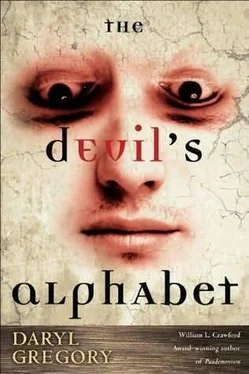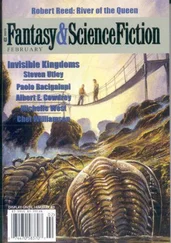It was already 10:30. Weygand paced, fiddled with his laptop, paced some more. He didn’t want to miss Rhonda’s press conference, which he somehow knew all about even though Pax hadn’t mentioned it. Something about a charity, Weygand said.
Just before noon Pax offered to make Weygand a sandwich. When he brought it out to him Weygand took it one-handed and started to eat, still tapping at the laptop.
Pax said, “So what did your Homeland Security guy say?”
“Not much.” Weygand wiped a dot of mayonnaise from his mouth with the back of his hand. “The big question is, what if-hey, is this baloney? I haven’t eaten baloney in… ever.”
“It’s better fried,” Paxton said.
“Wow. That’s so authentic. Next you’ll be feeding me possum.”
“Nobody eats possum anymore,” Pax said. “It’s all possum substitute now. I Can’t Believe It’s Not Possum.”
Weygand gave him a weird smile. “You know, you’re kinda funny when you’re high.” He nodded toward the kitchen. “What did you do back there?”
“Aw, just a little white lightnin’,” Pax said with a drawl. When he was out of sight of the living room he’d taken out the gloves again, but the vintage had dried out. He threw them in the garbage, then went to the freezer, where he kept three partly filled vials. He uncapped one of them, scraped a fingernail along the inside, and touched the icy residue to his tongue. The hit had been less than satisfying. Pax said, “You were talking about the big question.”
Weygand smiled, took another bite of his sandwich. After a moment he said, “The thing they’re all wondering about is, what if it’s not a natural virus? What if it’s been genetically engineered?”
“Ah. The massive government conspiracy I’ve heard so much about.” It was by far the most popular explanation for the Changes, at least in the early days of the quarantine. Several people in his church had been certain that secular humanist scientists had experimented on them without their knowledge. Second most popular was the cover-up-of-high-tech-accident theory-Switchcreek as a genetic down-winder story.
“Not our government, man,” Weygand said. “They can’t even keep their top-secret torture prisons out of the news. I’m talking about those other universes. What if the Changes are a deliberate incursion?”
“The other universe is attacking us? Sure, that makes sense. Every fifteen years they take out some town in the boondocks. In 2030 they’ll finally get the Eskimos.”
“‘Attack’ is the wrong word. Think immigration. Colonization. They’re trying to cross over.”
Pax laughed. “My dad may be a bull elephant, but he’s still my dad. I find it hard to believe that he’s a colonist from Planet Fat Boy.”
“Bull elephant?”
“I meant chub. Charlie. My dad is-” Pax inflated his cheeks, exhaled. “-big.”
“Oh, shit. I didn’t mean-”
“Don’t worry about it,” Pax said. “There’s a lot of it going around in this town.” Weygand didn’t seem to know what to say to that. He seemed genuinely sorry. After a moment Pax said, “I think I know what you’re getting at. It’s not my dad, per se.” Per se . This may have been the first time he’d said that aloud. “You mean his DNA.”
“Exactly,” Weygand said. “Any species that could learn to send its genes across the universes would go a long way to ensuring its own survival. The invaders would soon run into competition, though, because whatever species it colonized would have to figure out how to replicate too, because now it’s competing not only with all the other species on its planet, but with all its alternate selves across the universes.”
“Arms race,” Pax said, suddenly getting it. Or maybe he wasn’t understanding it on his own, he was… syncing up. Andrew’s thoughts seemed to be spilling into his own. “Argos versus chubs versus blanks.”
“Yes!” Andrew said. “And them versus us.” He hopped up, excited now. “Think about how weird it is that three distinct species came out of the Changes. It’s almost as if… Okay, say that the argos discovered the trick first. Maybe they even did it by accident. But anyway, they replicate into the universe of the betas. Then the betas figure it out-they engineer the virus to work for them. Now argos and betas are together in one universe, and together they invade the universe of the charlies. And so on and so on, across the universes, until they get to us. We’re at the front wave of a three-part war.”
“Wow,” Pax said.
“Yeah, wow.”
“So this is what your Homeland Security guy thinks? We’re at war?”
“He’s not in Homeland Security,” Weygand said. “He’s only nineteen. He writes about them.”
“Oh. Sure.”
For some reason they both laughed. Weygand sat down next to him. “This is the crappiest couch in the world,” he said.
“I should throw it out,” Pax said. Weygand’s arm was a few inches from his own, radiating heat.
A minute passed, maybe two.
Weygand said, “So, Paxton. What are you thinking right now?”
“I… I don’t know.”
Weygand laughed kindly. “Fair enough.” He leaned forward, knees on elbows. Pax regarded the architectural curve of his back, the frets of his spine. “I’ve been down this road before. Listen, why don’t you sober up and we’ll talk some more.”
Pax lifted his hand, then set it down between Weygand’s shoulder blades. Pax felt both his hand against his skin and the heat against his back; touched and toucher at the same time.
After a moment Weygand shook his head, laughing to himself. Or maybe laughing at himself. Then he started to get up, and as he rose Paxton’s palm slid down his back, each knuckle of his spine delivering a gentle tap. And then the contact was broken.
“I’ve got to get downtown,” Weygand said. “Maybe by the time I get back the twins will have shown up.”
Pax nodded.
“And get something to eat, okay, Pax?”
The twins didn’t come all that day, or the next.
They’d stayed away before, sometimes for days at a time, but this was the first time Paxton had waited for them, worried for them. The atmosphere in town had grown tense over the weekend. Friday afternoon a dozen beta women had driven to the Lambert Super Wal-Mart for their weekly Co-op shopping trip and walked into a line of pro-quarantine protesters. No one was hurt, but there’d been pushing and shoving; the betas had been forced to leave without their groceries. The store manager said that he’d arranged for the food to be delivered to the Co-op, but he’d made it clear to the reporters that he preferred that the Switchcreek people stayed at home until the protests died down.
Aunt Rhonda kept appearing on his TV screen, pushing for support of her new relief fund: Helping Hands to Babahoyo. She’d announced an 800 number; a software company in Memphis had already put up a supporting website. Three times Pax had seen her give what Weygand started calling the Azzamurkin speech: “As Americans, we’ve always been the first to reach out to those struck down by tragedy. As Americans, we must share the hard-won knowledge we’ve gained about TDS. As Americans…” The flag pin on her lapel and the green ribbon-for the victims in Ecuador, she said-had become permanent accessories.
Weygand said, “You see what she’s doing?” Pax thought, Running for office? But Weygand didn’t wait for an answer. “At the same time that she says she’s supporting the Ecuadorians, she’s saying, They aren’t us. We are Americans, we are Christians. They’re just brown people who live far away and happen to have the same disease. She might as well be raising money for earthquake victims.”
Читать дальше









